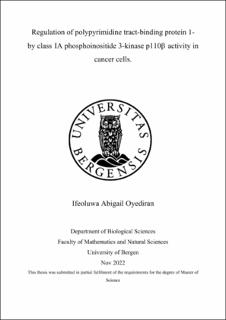| dc.description.abstract | Polypyrimidine tract binding protein 1 (PTB) is an extensively expressed RNA binding protein that regulates alternate splicing of exons in the nucleus. PTB is also localized in a nuclear body called perinucleolar compartment (PNC) that is predominantly present in aggressive cancer cells. PTB has been reported to be overexpressed in cancer cells and significant knockdown of PTB has been shown to inhibit cell proliferation while PNC has also been linked to regulating cancer cell gene expression, thereby suggesting the PNC as a biomarker for cancer. Polyphosphoinositides (PPIns) are membrane signalling lipids that interact with different proteins via electrostatic interactions. Some of these PPIns have been found to localize in the nucleus where they contribute to cellular processes including transcription and mRNA splicing, alongside their effector proteins. Previous reports from our group have shown that two different PPIns (PtdIns(4,5)P2 and PtdIns(3,4,5)P3) interact with PTB in the nucleus via an interatomic study. In addition, our group confirmed the direct binding of several PPIns to PTB in vitro and further identified two residues involved in the binding, K439 and K440. Here, we generated an additional residue R437L mutation in the full length PTB-K439A-K440L via site directed mutagenesis to assess its PPIn binding properties to PTB, but we were not able to express the protein. Additionally, we assessed the localization of the PTB-R437L-K439A-K440L mutant in vitro in comparison to WT PTB in the endometrial cell line MFE-319. Furthermore, we focused on regulating PTB protein expression levels. We showed that nuclear PI3K p110β activity (a PtdIns(3,4,5)P3-generating enzyme) may be involved in regulating PTB protein levels. Alternatively, we overexpressed a PI 5-phosphatase SKIP, in the nucleus to investigate the role PtdIns(4,5)P2 plays in regulating PTB levels but the fusion of the protein NLS-EGFP-SKIP did not express and so we were unable to examine PTB protein levels. This study hypothesized based on existing evidence that PtdIns(4,5)P2 may be involved in regulating PTB protein levels however, our result suggests that PI3K p110β activity may contribute to regulating PTB protein expression levels in the nucleus. | |
